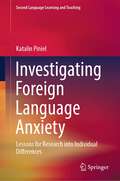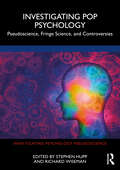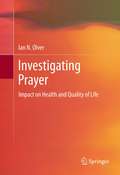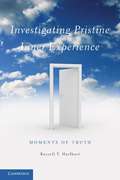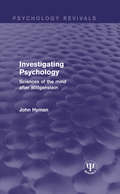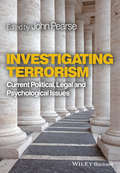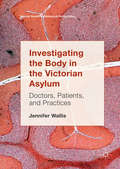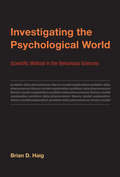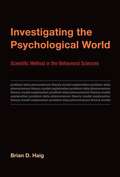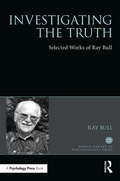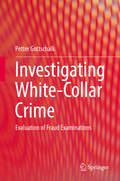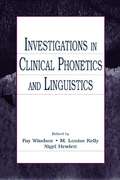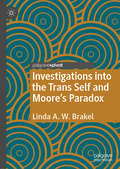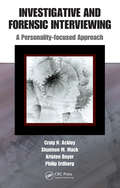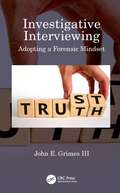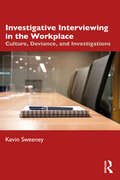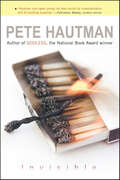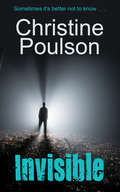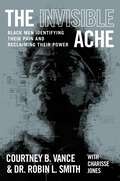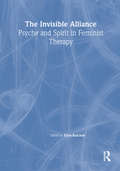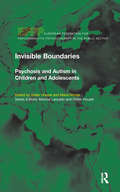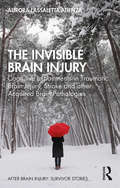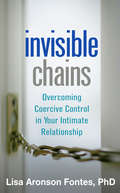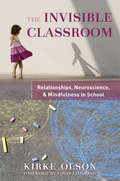- Table View
- List View
Investigating Foreign Language Anxiety: Lessons for Research into Individual Differences (Second Language Learning and Teaching)
by Katalin PinielThe introduction and a theoretical summary of language anxiety research (Chapter 1) are followed by four chapters: Chapter 2 presents a meta-analysis of the widely used Foreign Language Classroom Anxiety Scale’s (Horwitz, et al., 1986) factorial structure; Chapter 3 reports on a validation study of the Hungarian version of MacIntyre and Gardner’s (1994) Input, Process, and Output Anxiety Scales; Chapter 4 presents the development of a skills-based anxiety questionnaire through a three-phased study consisting of an exploratory qualitative phase as well as two quantitative phases using Rasch analysis; and Chapter 5 focuses on empirical approaches available for tapping into the dynamic change of this emotion, including the idiodynamic method and quantitative analyses such as latent growth curve modeling and dynamic cluster analysis.
Investigating Pop Psychology: Pseudoscience, Fringe Science, and Controversies
by Stephen Hupp Richard WisemanInvestigating Pop Psychology provides the basic tools required to make evidence-informed decisions and thoughtfully distinguish science from pseudoscience through the application of scientific skepticism. Psychologists conduct scientific investigations into a lot of strange things including alien encounters, horoscopes, dream interpretation, superstition, and extrasensory perception (ESP). Through a digestible, open-minded format combined with relevant and topical case studies such as energy psychology, demonic possession, and horoscopes, this book offers an engaging read which encourages students to think critically about the information they are exposed to during their academic careers and beyond. By taking a fresh look into investigations regarding pseudoscience and fringe science in pop psychology, it celebrates the science of psychology while also providing warnings about the problem of pseudoscience in pop psychology. Providing tips on how to consider evidence regarding the strength of claims in pop psychology, Investigating Pop Psychology is an ideal resource for undergraduate introductory psychology students and for students studying science and pseudoscience.
Investigating Prayer
by Ian OlverThis book relates the experience of researching, planning, and conducting a scientific study into intercessory prayer (prayer for others). The purpose of the study was to ascertain whether the impact of prayer could be measured in a formal study, based on the large number of anecdotal reports of efficacy. The study was a prospectively randomized double-blind trial that added prayer by an established Christian prayer group to conventional therapy for cancer. The unique design feature was that the primary endpoint was a change in a validated scale of spiritual well-being. The patients were informed that they were participating in a study about spiritual well-being and quality of life but remained blinded to the intervention. The initial observation from the baseline data was that spiritual well-being made a unique contribution to quality of life. The final outcome of the study was that there was a statistically significant difference in spiritual well-being favoring the prayer group. The background includes a fascinating review of the medical literature on the topic, which contains positive and negative studies that each attracts a vigorous debate about methodology, endpoints, and whether metaphysical phenomena can or should be studied using scientific methodology. The complementary and alternative medicine literature is also equivocal as to whether prayer, arguably the most common complementary medical therapy, should be included in the range of interventions grouped under that heading. In addition to reporting the background and results of the study, the book explores the reactions of a range of individuals to the trial, all of which help reflect on the nature of prayer.
Investigating Pristine Inner Experience
by Russell T. HurlburtYou live your entire waking life immersed in your inner experiences (thoughts, feelings, sensations and so on) - private phenomena created by you, just for you, your own way. Despite their intimacy and ubiquity, you probably do not know the characteristics of your own inner phenomena; neither does psychology or consciousness science. Investigating Pristine Inner Experience explores how to apprehend inner experience in high fidelity. This book will transform your view of your own inner experience, awaken you to experiential differences between people and thereby reframe your thinking about psychology and consciousness science, which banned the study of inner experience for most of a century and yet continued to recognize its fundamental importance. The author, a pioneer in using beepers to explore inner experience, draws on his 35 years of studies to provide fascinating and provocative views of everyday inner experience and experience in bulimia, adolescence, the elderly, schizophrenia, Tourette's syndrome, virtuosity and more.
Investigating Psychology: Sciences of the Mind After Wittgenstein (Psychology Revivals)
by John HymanOriginally published in 1991, the essays in this volume are written by philosophers who were convinced that Wittgenstein’s investigations in philosophical psychology were of direct relevance to current experimental psychology at the time. Rather than reflecting on the nature of psychological theory at a high level of abstraction, they examined leading theories and controversies in the experimental study of vision and of language in order to reveal the conceptual problems that they raise and the philosophical theories that have exerted an influence upon them. Under the section headings ‘Language and Behaviour’ and ‘Perception and Representation’, the essays examine the work of Chomsky, Gregory, Marr, Weiskrantz and others, and discuss problems ranging from artificial intelligence to animal communications, from blindsight to machine vision. The collection aims to demonstrate that philosophical investigations can contribute to psychological science by extirpating conceptual confusions which have been woven into the fabric of empirical research. The majority of the essays had been specially commissioned, and the contributors include several of the most distinguished exponents of Wittgenstein’s philosophical legacy at the time.
Investigating Terrorism
by John PearseInvestigating Terrorism takes a look behind the closeddoors of terrorist cases. Major players from the world ofcounter-terrorism, including politicians, lawyers, psychologistsand police, offer analyses of recent terror attacks and share theirknowledge of terrorist behaviour Deals with legal, psychological and practical issuessurrounding how to deal with a real life 'ticking bomb'scenarioProvides an insight into the most recent police model forinterviewing witnesses, victims and suspectsContains the latest analyses of recent terrorist attacksincluding the recent Norwegian tragedy carried out by terroristAnders BreivikContains the views of major players in the world ofcounter-terrorism, including Lord Carlile, the former HMG'sIndependent Reviewer of Terrorist legislation, and Peter Clarke,the recently retired Head of Terrorist Investigations for theUKIncorporates recently-released findings from studiescommissioned by New Scotland Yard to study the effectiveness ofpolice interviews with terrorist suspectsIncludes chapters discussing the context in which people becomesuicide bombers
Investigating the Body in the Victorian Asylum
by Jennifer WallisThis book is open access under a CC BY 4. 0 license. This book explores how the body was investigated in the late nineteenth-century asylum in Britain. As more and more Victorian asylum doctors looked to the bodily fabric to reveal the 'truth' of mental disease, a whole host of techniques and technologies were brought to bear upon the patient's body. These practices encompassed the clinical and the pathological, from testing the patient's reflexes to dissecting the brain. Investigating the Body in the Victorian Asylum takes a unique approach to the topic, conducting a chapter-by-chapter dissection of the body. It considers how asylum doctors viewed and investigated the skin, muscles, bones, brain, and bodily fluids. The book demonstrates the importance of the body in nineteenth-century psychiatry as well as how the asylum functioned as a site of research, and will be of value to historians of psychiatry, the body, and scientific practice.
Investigating the Psychological World: Scientific Method in the Behavioral Sciences (Life and Mind: Philosophical Issues in Biology and Psychology)
by Brian D. HaigA broad theory of research methodology for psychology and the behavioral sciences that offers a coherent treatment of a range of behavioral research methods. This book considers scientific method in the behavioral sciences, with particular reference to psychology. Psychologists learn about research methods and use them to conduct their research, but their training teaches them little about the nature of scientific method itself. In Investigating the Psychological World, Brian Haig fills this gap. Drawing on behavioral science methodology, the philosophy of science, and statistical theory, Haig constructs a broad theory of scientific method that has particular relevance for the behavioral sciences. He terms this account of method the abductive theory of method (ATOM) in recognition of the importance it assigns to explanatory reasoning. ATOM offers the framework for a coherent treatment of a range of quantitative and qualitative behavioral research methods, giving equal treatment to data-analytic methods and methods of theory construction. Haig draws on the new experimentalism in the philosophy of science to reconstruct the process of phenomena detection as it applies to psychology; he considers the logic and purpose of exploratory factor analysis; he discusses analogical modeling as a means of theory development; and he recommends the use of inference to the best explanation for evaluating theories in psychology. Finally, he outlines the nature of research problems, discusses the nature of the abductive method, and describes applications of the method to grounded theory method and clinical reasoning. The book will be of interest not only to philosophers of science but also to psychological researchers who want to deepen their conceptual understanding of research methods and methodological concerns.
Investigating the Psychological World
by Brian D. HaigA broad theory of research methodology for psychology and the behavioral sciences that offers a coherent treatment of a range of behavioral research methods.
Investigating the Truth: Selected Works of Ray Bull (World Library of Psychologists)
by Ray BullIn the World Library of Psychologists series, international experts present career-long collections of what they judge to be their finest pieces – extracts from books, key articles, salient research findings, and their major practical theoretical contributions. The Selected Works of Professor Ray Bull include some of the most influential insights into the psychology of investigative interviewing. Whether it has been determining whether a suspect is lying or telling the truth, enabling children to provide reliable testimony, or understanding how the dynamics of the interview process itself can affect what is achieved, Professor Bull has been at the forefront in researching this fascinating area of applied psychology for over 40 years, his work informing practice internationally. An elected Honorary Fellow of the British Psychological Society and the first Honorary Life Member of the International Investigative Interviewing Research Group, Professor Bull also drafted parts of the government’s Memorandum of Good Practice and of Achieving Best Evidence on Video Recorded Interviews with Child Witnesses for Criminal Proceedings. Including a specially written introduction in which Professor Bull reflects on a wide-ranging career and contextualises how the field has evolved, this collection will be a valuable resource for students and researchers of forensic psychology.
Investigating White-Collar Crime
by Petter GottschalkThis book presents descriptions of theories about white-collar crime offenders and offenses. A case study is developed from a sample of 369 white-collar criminals generated by extracting newspaper stories and supplemented by court records. Numerous approaches to white-collar crime are organised and applied to the database. Theories are catalogued and tested against empirical data. The main aim of this book is to present a framework for a general theory of white-collar crime based on a number of sub-theories. Over the years, from research done on white-collar crime, three major characteristics have been attributed. First there is economics, where non-violent acts are committed for financial gain. Next there is organisation, where offenders take advantage of professional authority and power to commit crime. Finally, there is behaviour, where a number of deviant personality traits are often found. Criminal investigation is a procedure or method for reconstructing the past. Its purpose is creating an account of what has happened, how it happened, and who did what to make it happen. Private investigation cases are evaluated based on a number of theories and criteria. The success or failure of a private investigation can be measured at different stages in the process: basis for initiation of investigation, work methodology, investigation results, and investigation consequences. This book presents case studies of private investigation reports by financial crime specialists and fraud examiners.
Investigations in Clinical Phonetics and Linguistics
by Fay Windsor M. Louise Kelly Nigel HewlettInvestigations in Clinical Phonetics and Linguistics is a sequel to the eighth meeting of the International Clinical Phonetics and Linguistics Association, attended by delegates from 26 different countries. This book reflects the scope of the subject area of clinical phonetics and linguistics, the balance of input into it with respect to the different kinds of research being carried on, and the representation of researchers from different parts of the world. Its scope includes the application of all levels of linguistic analysis and the chapters of the book have been ordered as far as possible according to linguistic level, beginning with pragmatics and ending with acoustics. It will be immediately apparent that a greater number of chapters are concerned with applications of phonetics and phonology then with any other levels.
Investigations into the Trans Self and Moore's Paradox
by Linda A. BrakelThis book explores how the trans phenomenon can challenge the existing concept of the Self and its nature. The catalyst is Moore’s Paradox: can a trans person coherently state ‘I am a girl but I don’t believe that’? More deeply, three fundamental philosophical questions arise, of ontological, epistemological, and conceptual significance: what Self understands that the natal-gender is ‘wrong’? How does the trans person know that the natal-gender is ‘wrong’ and what counts as evidence? And finally, how does this effect the concept of Self itself? Seeking answers, Brakel considers various theories of the Self, including classical accounts, modern views, and models developed by selected gender theorists. The book then takes a biological turn, first developing an evolutionary proper-function analysis of gender and trans-gender and subsequently proposing the possibility of a new ontological phenotype. With a review of cutting-edge neuroscientific research conducted over the last twenty-five years, Brakel propels this timely and important investigation toward the future, using experimental philosophy empirical studies adapted from classic thought experiments on the nature of the Self.
Investigative and Forensic Interviewing: A Personality-focused Approach
by Craig N. Ackley Shannon M. Mack Kristen Beyer Philip ErdbergInvestigative and Forensic Interviewing: A Personality-Focused Approach looks at the personality styles most commonly encountered in the criminal justice system and demonstrates how to use this insight to plan and conduct a productive interview. The book includes chapters on narcissistic, antisocial, psychopathic, borderline, inadequate/immature, p
Investigative Interviewing: Adopting a Forensic Mindset
by John E. Grimes IIIInvestigative Interviewing: Adopting a Forensic Mindset aims to promote legal and ethical investigative interview methods. Accordingly, possessing a forensic mindset should be the foundation that governs every aspect of an investigative interviewer's actions. Being a forensic professional—which includes the field of forensic interviewing—infers that one applies the highest standards in collecting, analyzing, preserving, and presenting evidence to a court of law or other tribunals. The term "investigative interview” with an interviewer's forensic mindset can be used to achieve all interview objectives, even obtaining truthful confessions that stand up to the scrutiny of the courts and public opinion. Key to this, the author contends, is eliminating the term “interrogation” and the confession-obtaining mindset it creates. In its place, the term “investigative interview” is used, promoting a forensic mindset to achieve desired interview objectives. What transpires during the interview must stand up to the scrutiny of the courts and public opinion. In this regard, due process, documenting the procedure, and practicing proven, effective techniques is paramount to getting to the truth—the ultimate goal of any investigation. The book includes a chapter dedicated to false confessions, due to is criticality and frequent occurrences of this. It continues with a discussion on the desired qualities of an investigative interviewer and strategies to break down barriers and gain trust with reluctant, uncooperative, and hostile interviewees. Proper report writing, an underrated key to any interview and investigation, is addressed in detail. Lastly. the book provides training on best practice interview steps and strategies to lead the interviewee to the truth that will stand up to the scrutiny of the courts and public opinion. Investigative Interviewing: Adopting a Forensic Mindset is well-suited as a textbook—outlining techniques and detailing all relevant case law concerning confessions— in addition to providing an Instructor’s Manual with Test Bank and PowerPoint slides for professors to utilize in classroom instruction.
Investigative Interviewing in the Workplace: Culture, Deviance, and Investigations
by Kevin SweeneyBased on extensive interdisciplinary research and the author’s over 30 years of experience in the field, this book provides best practice skills for auditors and investigators in any type of investigation and adapts them to ensure they are relevant to a corporate environment where the powers available to police are absent. In addition to providing technical skills and practical advice on investigative interviewing, former police investigator Kevin Sweeney explains how to analyze information to assist in the investigation and to identify emerging trends to provide opportunities to prevent problems before they occur. Readers will come to understand legal concepts such as the chain of evidence, the psychological factors involved in questioning, and the sociological factors that can help to build a macro understanding of the organization and the event in question. This book will become an essential resource for professionals involved in auditing or investigation work of any type in the corporate or public sectors, in contexts including human resources, employee relation investigations, auditing, or where criminal activity is suspected.
Invisible
by Pete HautmanYou could say that my railroad, the Madham Line, is almost the most important thing in my life. Next to Andy Morrow, my best friend. Lots of people think Doug Hanson is a freak -- he gets beat up after school, and the girl of his dreams calls him a worm. Doug's only refuge is creating an elaborate bridge for the model railroad in his basement and hanging out with his best friend, Andy Morrow, a popular football star who could date any girl in school. Doug and Andy talk about everything -- except what happened at the Tuttle place a few years back. It does not matter to Andy that we live in completely different realities. I'm Andy's best friend. It does not matter to Andy that we hardly ever actually do anything together. As Doug retreats deeper and deeper into his own reality, long-buried secrets threaten to destroy both Doug and Andy -- and everything else in Doug's fragile world.
Invisible
by Christine PoulsonLisa has a secret lover, an escape from the pressures of caring alone for her son, who has cerebral palsy. Once a month she meets Jay, just for the weekend, free from all responsibilities. Their time together is perfect – until the day when Jay doesn't show up, and everything she thought she knew about him turns out to be a lie.For Jay it was perfect, too. But he shouldn't have let himself fall in love with Lisa, because now the people who destroyed his entire life five years ago are onto him and he must disappear again …
Invisible
by Christine PoulsonLisa has a secret lover, an escape from the pressures of caring alone for her son, who has cerebral palsy. Once a month she meets Jay, just for the weekend, free from all responsibilities. Their time together is perfect – until the day when Jay doesn't show up, and everything she thought she knew about him turns out to be a lie.For Jay it was perfect, too. But he shouldn't have let himself fall in love with Lisa, because now the people who destroyed his entire life five years ago are onto him and he must disappear again …
The Invisible Ache: Black Men Identifying Their Pain and Reclaiming Their Power
by Courtney B. Vance Dr. Robin L. Smith"A thoughtful, wise, empathetic book that has the capacity to save lives. " (Kirkus) "...an inspiring story of what [Black men] can achieve personally and professionally when they have the tools and support necessary to examine their pain and find their joy." (New York Journal of Books) A moving combination of memoir, psychology, and practical tools, this book offers Black men guidance and support for reclaiming mental well-being and finding whole, full-hearted living. Early in his career, actor Courtney B. Vance lost his father to suicide. Recently, he lost his godson to the same fate. Still, as mental health discourse hits the mainstream, it leaves the most vulnerable out of the conversation: Black men. In America, we teach that strength means holding back tears and shaming your own feelings. In the Black community, these pressures are especially poignant. Poor mental health outcomes-- including diagnoses of depression and anxiety, reliance on prescription drugs, and suicide-- have skyrocketed in the past decade. Institutionalized racism, microagressions, and stress caused by socioeconomic factors have led Black individuals to face worse mental health outcomes than any other demographic. In this book, Courtney B. Vance seeks to change this trajectory. Along with professional expertise from famed psychologist Dr. Robin L. Smith (popularly known as &“Dr. Robin&”), Courtney B. Vance explores issues of grief, relationships, identity, and race through the telling of his own most formative experiences. Together, Courtney and Dr. Robin provide a guide for Black men navigating life&’s ups and downs, reclaiming mental well-being, and examining broken pieces to find whole, full-hearted living. Self-care is an act of revolution. It&’s time to revolutionize mental health in the Black community.
The Invisible Alliance: Psyche and Spirit in Feminist Therapy
by Ellyn KaschakExplore the relationship between psychology and spirituality from a feminist perspective!From the editor: “There are forces in the universe about which we know nothing and can learn nothing through empiricism and material means. Such forces can be invoked in the process of therapy to assist in healing, to deepen experience, and to free us from the confining limits of the human mind. This is a book about the spiritual within each of us and about spirituality as it extends beyond any of us to embrace all of us. It deals with inspiration and passion, sorrow and loss, meaning and depth. It focuses upon the relationship between matters of spirit and of psychology, leading to new treatments within the parameters of psychotherapy that extend its vision far beyond the treatment of affliction.”The Invisible Alliance: Psyche and Spirit in Feminist Therapy provides you with a comprehensive review of multiculturalism and its relationship with feminism and spirituality and explores: ways to incorporate Jewish principles and beliefs into feminist therapy the application of religious sources of passion and perspective to parenting and working with children ways to combine Christian and Wiccan philosophies in therapy a provocative approach for integrating Christian biblical teachings into feminist therapy for survivors of sexual abuse ways that Buddhist ideas can enrich the understanding of the self and identity a case study of ancient healing traditions used by Latinas criteria for therapists to use in deciding whether to work with clients dealing with spiritual/religious issues or refer them to someone more appropriate a way to use the power of ritual to heal and give more meaning to important life transitions
Invisible Boundaries: Psychosis and Autism in Children and Adolescents (The\efpp Monograph Ser.)
by Didier Houzel Maria RhodeThis volume is an outcome of the European Federation for Psychoanalytic Psychotherapy conference on psychotic and autistic conditions in childhood and adolescence, encouraging the cross-fertilization of psychoanalytic practice and theory across the international boundaries in Europe.
The Invisible Brain Injury: Cognitive Impairments in Traumatic Brain Injury, Stroke and other Acquired Brain Pathologies (After Brain Injury: Survivor Stories)
by Aurora Lassaletta AtienzaThe Invisible Brain Injury recounts, in her own words, the experience of Aurora Lassaletta, a clinical psychologist who suffered a traumatic brain injury (TBI) after a traffic accident. Presenting her unique dual perspective as both a patient and a clinician, Aurora highlights the less visible cognitive, emotional and behavioural symptoms common to acquired brain injury (ABI). This moving account showcases Aurora’s growing awareness of her impairments, their manifestation in daily life, how they are perceived, or not, by others and the tools that helped her survive. Each chapter combines Aurora’s perspective with the scientific view of a professional neuropsychologist or physiatrist who provide commentaries on her various symptoms. This book is valuable reading for professionals involved in neurorehabilitation and clinical neuropsychology and for clinical psychology students. It is a must read for ABI survivors, those around them and clinicians, who are all an essential part of the rehabilitation, adjustment and acceptance process involved with ABI.
Invisible Chains: Overcoming Coercive Control in Your Intimate Relationship
by Lisa Aronson FontesWhen a man showers all of his attention on a woman, it can feel incredibly romantic, and can blind her to hints of problems ahead. But what happens when that attentiveness becomes domination? In some relationships, the desire to control leads to jealousy, threats, micromanaging--even physical violence. If you or someone you care about are trapped in a web of coercive control, this book provides answers, hope, and a way out. Lisa Aronson Fontes draws on both professional expertise and personal experience to help you:*Recognize controlling behaviors of all kinds.*Understand why this destructive pattern occurs.*Determine whether you are in danger and if your partner can change.*Protect yourself and your kids.*Find the support and resources you need.*Take action to improve or end your relationship.*Regain your freedom and independence.
The Invisible Classroom: Relationships, Neuroscience & Mindfulness in School (The Norton Series on the Social Neuroscience of Education)
by Kirke Olson Louis CozolinoImproving student learning with the tools of neuroscience and mindfulness. How is expanding students' strengths more effective than improving their weaknesses? Why is creating a school where staff and students feel safe necessary for learning? How can anchoring with simple mindfulness practices prevent classroom behavioral problems? There is more to a classroom than just a teacher and a group of students. All classroom interactions have "invisible" neurobiological, emotional, and social aspects--the emotional histories of students, the teacher's own background and biography. In this book, Kirke Olson takes lessons from brain science, mindfulness, and positive psychology to help teachers understand the full range of their students' school experiences. Using its classroom-ready resources, teachers, administrators, parents, and policy makers can make the invisible visible, turning human investment in their students into the best possible learning outcomes.
